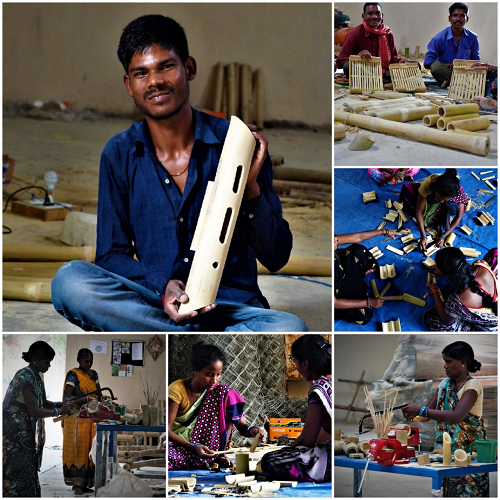Bamboo artisans weave rural prosperity through sustainable craftsmanship



Decent Work and Economic Growth - SFURT's objective of promoting and revitalizing traditional industries contributes to creating decent work opportunities and fostering economic growth. By supporting and empowering small and medium enterprises in traditional industries, the initiative aims to improve livelihoods and enhance economic prosperity in local communities. This aligns with SDG 8, which seeks to promote sustained, inclusive, and sustainable economic growth, full and productive employment, and decent work for all. inadequate medical facilities in these underserved regions
The Scheme of Fund for Regeneration of Traditional Industries (SFURT) is an initiative by the Ministry of Micro, Small, and Medium Enterprises (MSME), Government of India, aimed at promoting and revitalizing traditional industries. One such project supported by SFURT is being implemented by Shikhar Yuva Manch (SYM) in Korba District, Chhattisgarh.
Korba District is known for its rich bamboo artisan community, who have been practicing traditional bamboo craft for generations. However, over time, the livelihood of these artisans has faced challenges due to changing market dynamics, lack of access to resources, and limited exposure to modern marketing techniques. The SFURT project in Korba aims to rejuvenate this traditional industry and empower the bamboo artisans.
SYM set up a Common Facility Centre equipped with modern tools and equipment required for bamboo craftsmanship. The CFC serves as a centralized workspace for artisans to create and showcase their products effectively.
SYM identifies bamboo artisans in Korba District who can benefit from the project and engage in bamboo craft activities.
The SFURT project has empowered 903 bamboo artisans in Korba District, enabling them to expand their craft skills and income opportunities
In conclusion, the SFURT project implemented by Shikhar Yuva Manch in Korba District has played a pivotal role in revitalizing the traditional bamboo industry. Through the establishment of the Common Facility Centre, skill development, and market linkages, the project has empowered the artisans, improved their livelihoods, and fostered a sustainable future for the traditional craft in the region.